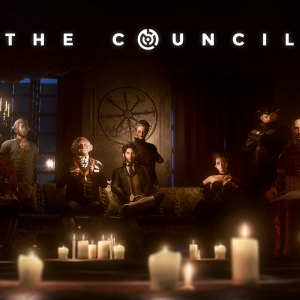
Xbox One Storytellers: Big Bad Wolf on The Council
It’s hard to match the narrative scope and immersive experience that a compelling story-driven game has over other storytelling mediums, allowing players not only to fall into the world of a well-crafted story but to experience it firsthand. These types of games can empower someone with a new perspective or let us live a double-life as a superhero. Narrative-driven games allow us to become someone we’re not, which is perhaps the biggest reason we enjoy these experiences. Now, with the power of Xbox One X, creators can bring us even closer to their vision. With our Xbox One Storytellers series, we’ll sit down with some of the industry’s greatest creators to talk about the strength of storytelling within games, their inspirations, and how they see the genre growing in the years ahead. Today, we’ll be talking to Sylvain Sechi, Game Director at Big Bad Wolf.
Is there a secret to crafting a compelling single-player narrative?
In my mind, there are two: Consequences and Plot Twists. Consequences for a narrative experience means players must have an impact on the main plot, as well as the story arcs of characters. Plot Twists, in my opinion, offer re-contextualization, which means the player can revisit previous events, which will, in the light of a plot twist, reveal secrets that were hidden in plain sight since the beginning. Both allow for immersion and a sense of wonder.
Do you think single-player experiences create a better sense of immersion than multiplayer experiences?
I personally don’t think so. Both are unique and bring a different sense of fulfillment, but, in their own way, they both can be deeply immersive to a point you’re in the “flow” with the game.
How do you balance your narrative goals with your gameplay goals?
At Big Bad Wolf, we don’t actually. We don’t want balance between them, we want them to be the same, that’s the reason we spend so much time making sure we create common goals for the player and character, offering interactions that answer what they are trying to achieve.
Have things like branching missions and multiple unique endings changed single-player game development?
From our perspective, where our main strength lies is in delivering real consequences. I would say yes, it requires a lot of craft to make sure you don’t create dead ends, and that all paths are as different as they are interesting to play. But it’s totally worth it, as we’re creating story in an interactive media, and making choices that have consequences are the essence of a video game. We wouldn’t do it differently.
Are there any genres you think story doesn’t matter, or ones you think fit the goal of telling a story better than others?
It really depends on your definition of story here. In a sports game for example, I believe when a player pulls out a victory at the very last second after playing a heated game against a friend, he creates an incredible story, very different from single-player narrative, but just as strong. This kind of emergent storytelling may happen in any genre, providing designers lay the ground for it.
What sort of benefits do more powerful consoles and PCs offer to single-player storytellers?
The ease of sharing stories is a huge innovation that benefits single-player storytelling a lot. Through video-sharing of course, but also things as simple as the rich presence text that displays “Tom is playing the final act of Mass Effect”, where this may trigger a conversation about choices your friend did, and the ones you did, leading players to discover the game really handles consequences for your actions. Everybody loves to tell tales!
Were there any single-player experiences in your gaming life that inspired you to create or really struck a chord with you?
Regarding storytelling, the games that inspired me most are Knights of the Old Republic for its great characters/plot twist, Ultima Online for its online roleplaying aspects and Fable for its ability to show how you impact the world around you.
Is there a specific game’s single-player level or narrative moment you consider close to a perfect narrative experience?
I recently played Shadow Tactics: Blades of the Shogun – the way you actually play the story during the final interaction of the final scene really struck me as beautifully executed.
How have single-player/narrative games changed most over the last 10 years?
The fact that games and platforms now have a “social” dimension like comparing (Walking Dead end-of-episode screen) and sharing stories (live video-capture) changed the way players experience single-player/narrative. Some games on the indie scene have also created innovation, instead of making a game with a story, some have tried doing a story that is the actual game (Her Story). Episodic content is also a new thing from this decade that keeps expanding for single-player games.
How do you see single-player games evolving over the next 10 years?
I think we’re going in a direction where we’ll have more and more AI assisted tools. This will help, for instance, to create arcs for secondary characters, story-world building and maybe even main characters. That will mean much more narrative content within games, even in those where we are not used to seeing narratives. I also do think we might see some really amazing chat-bot games in the coming decade.
